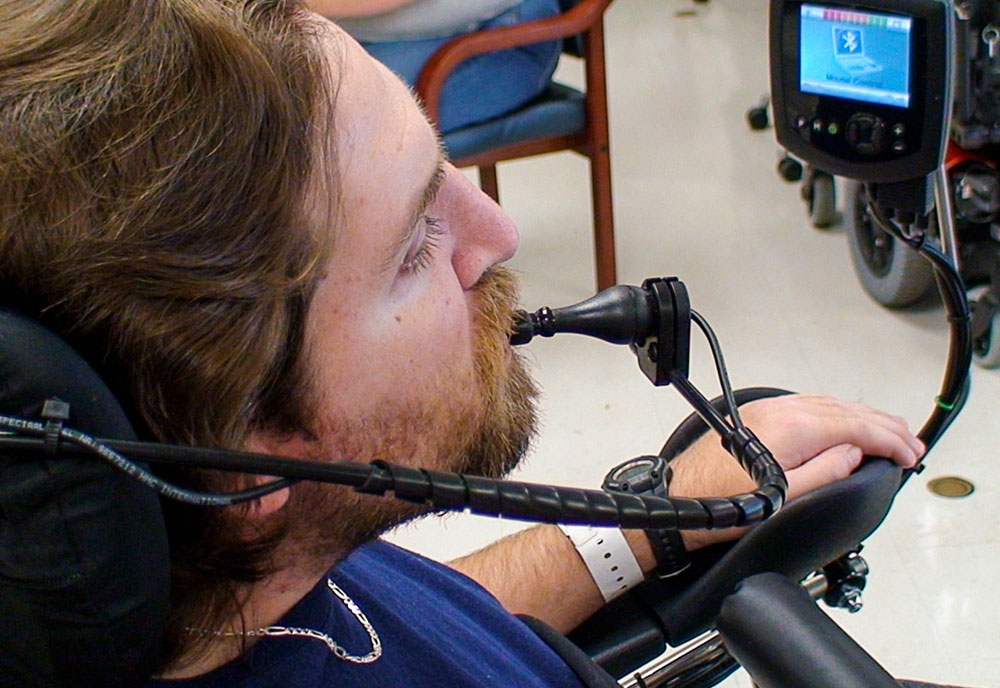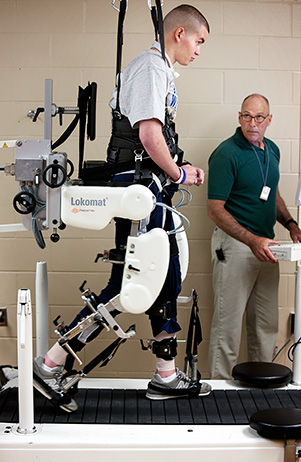Veterans Health Administration
Change Your Mind about Brain Injury

TBI treatments are guided by an individualized rehabilitation plan
Last week, Dr. Joel Scholten suggested to a gathering of medical professionals that it is time to “Change your mind about brain injury.”
Treatment and understanding of traumatic brain injury (TBI) is improving every day and VA is helping to lead the way.
Scholten is the acting national director of VA’s Physical Medicine & Rehabilitation Program Office. The occasion, at Walter Reed National Military Medical Center, was an Educational Forum on Best Practices and Current Research to mark the opening of Brain Injury Awareness Month.
The month is dedicated each year to raise awareness, promote prevention and provide education and support.
Here are the brain injury statistics for OEF/OIF/OND* Veterans from 2007 to September 30, 2014:
- 883,883 have been screened for possible mild TBI
- 166,049 screened positive and consented to follow-up comprehensive evaluation
- 124,751 completed comprehensive evaluation
- 73,469 received confirmed diagnosis of mild TBI
Not all TBI cases are combat related as explained here.

Dr. Joel Scholten
According to Scholten, “The hallmark of TBI rehabilitation is the development of an individualized care plan delivered by an interdisciplinary team of professionals in collaboration with the Veteran and their family.”
Scholten briefed the forum on VA’s Polytrauma System of Care which has 110 specialized rehabilitation sites across VA including five Polytrauma Rehabilitation Centers, 23 Polytrauma Network Sites, and 87 Polytrauma Support Clinic Teams around the country providing the full continuum of Traumatic Brain Injury care services.
Beginning in 2005, VA developed the Polytrauma System of Care to provide world-class rehabilitation services and to ensure that Veterans and Servicemembers with polytrauma would be able to transition seamlessly between Department of Defense and VA and back to their home communities.
VA’s Polytrauma System of Care case managers have been nationally recognized as a successful and innovative case management program.
This integrated network of over 100 programs across four echelons of care specializes in clinical rehabilitation services, including:
- Assessments and treatments by interdisciplinary teams of rehabilitation specialists
- Specialty care management
- Patient and family education and training
- Psychosocial support
- Advanced rehabilitation and prosthetic technologies.
At the location closest to the Veteran’s Home

Assistive Technology
VA’s Polytrauma System of Care balances access and expertise to provide specialized polytrauma and Traumatic Brain Injury care at the location closest to the Veteran’s home with the expertise necessary to manage his/her rehabilitation, medical, and psychosocial needs.
The course of rehabilitation for TBI and polytrauma may vary significantly by patient based on the severity of injury, time since injury, and current needs and goals. Treatments are guided by an individualized rehabilitation and community re-integration plan of care and are delivered by an interdisciplinary team of rehabilitation specialists in collaboration with the Veteran and the caregiver.
Polytrauma case managers ensure seamless coordinated care for Veterans and Servicemembers in need of services such as:
- Specialized inpatient and outpatient rehabilitation
- Emerging consciousness program
- Transitional rehabilitation
- Assistive technology labs
- Polytrauma telerehabilitation
- Vocational services
- Community re-entry programs
VA’s Polytrauma System of Care case managers have been nationally recognized as one of the most successful and innovative case management programs working to improve healthcare across the care continuum.
As Dr. Scholten noted, “The vast majority of individuals who sustain a mild TBI will completely recover. For those with persistent symptoms, VA has developed a system of care that supports Veterans throughout the care continuum with TBI specialists delivering state-of-the-art care.”
*OEF/OIF/OND: Operation Enduring Freedom, Operation Iraqi Freedom and Operation New Dawn.



















